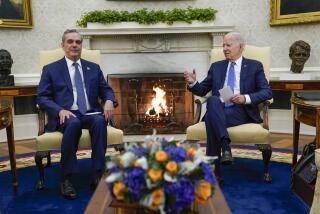U.S. Vows New Effort on Trade, Budget Deficits : President Tells IMF and World Bank That U.S. Will Act on Interest Rates
- Share via
WASHINGTON — President Reagan on Tuesday acknowledged that huge U.S. trade and budget deficits are a drag on world economic growth and vowed renewed efforts to reduce them.
Reagan also said that the Administration intends to push domestic interest rates lower and to resist protectionist pressures in Congress as its part in promoting faster global growth. He once again called on Europe and Japan to stimulate their economies to boost expansion, an action they have stoutly resisted.
The President’s comments came in an address to the 41st annual meeting of the International Monetary Fund and the World Bank, sister institutions created after World War II to stabilize currencies, finance the postwar reconstruction of Europe and Japan, and provide loans for development in poor countries.
The Reagan speech comes against a backdrop of bickering among the major industrial nations over interest rates, the value of the dollar and trade restrictions. Although the United States retreated over the weekend from demands that Bonn and Tokyo cut domestic interest rates to spur growth, Reagan repeated a threat to drive the dollar lower to improve sales of U.S. goods abroad and reduce the gaping American trade deficit.
“The only way to resolve the external imbalances between countries is through increased growth abroad, a greater competitiveness for the U.S. dollar or both, coupled with the opening of markets,” the President said.
Dollar’s Value Off 40%
The dollar has lost about 40% of its value in relation to German and Japanese currencies since last September, when the five major trading partners agreed to weaken the then-overvalued currency. European and Japanese finance ministers and bankers said this week that the dollar has fallen far enough and agreed to prop it up in world currency markets if it should resume its steep decline.
American officials, however, appear willing to see the dollar fall further to make U.S. exports cheaper and imports more expensive. That is seen as one way to reduce the U.S. trade deficit, which is likely to hit $170 billion this year, according to some estimates.
Trade figures released Monday appeared to indicate that the strategy was beginning to show results. The trade deficit improved to $13.3 billion in August, compared to $18 billion in July.
Reagan repeated his call for the elimination of tariffs and other barriers to open world trade. “No trading system among equals can survive if some feel they are being discriminated against and if there are enormous imbalances in trade flows,” the President said.
This year’s IMF-World Bank meeting, which has drawn more than 2,500 economic and financial policy-makers from 151 member countries, marks the departure of one key official and the arrival of another.
Jacques de Larosiere, a former French finance minister, is stepping down after eight turbulent years as managing director of the IMF, and Barber Conable takes the helm of the World Bank.
In an address to the session, De Larosiere stressed the need for close policy coordination and increased flows of money to the Third World.
He took a sharp slap at commercial bankers for cutting their lending to indebted countries and appeared to blame them for the difficulty in negotiations now under way between Mexico and its bankers over $6 billion in new loans.
“Let me be very frank. This has been an area of disappointment,” De Larosiere said about the reluctance of the banks to commit new funds for debtor nations.
De Larosiere also made an unusually blunt reference to bloated bureaucracies and high defense spending, suggesting that social programs should receive more of those expenditures.
“For example, safeguarding human needs may imply that employment in overstaffed and loss-making public enterprises or defense spending be reduced in preference to cutting an accelerated immunization and health-care program for children,” he said.
The meeting also saw the first major address by Conable, the former New York congressman who assumed the presidency of the World Bank in July.
His speech was low-key and folksy, recalling his roots in Upstate New York and quoting from Thoreau, Cervantes and Pope John XXIII.
He emphasized agricultural modernization, the status of women and environmental preservation as key concerns of the World Bank.
Conable’s talk was long on compassion for the poor of the developing world but did not offer new policy initiatives or chart a new course for the bank.
More to Read
Inside the business of entertainment
The Wide Shot brings you news, analysis and insights on everything from streaming wars to production — and what it all means for the future.
You may occasionally receive promotional content from the Los Angeles Times.










